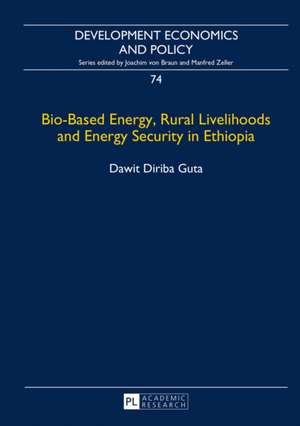Bio-Based Energy, Rural Livelihoods and Energy Security in Ethiopia: Development Economics and Policy, cartea 74
Autor Dawit Diriba Gutaen Limba Engleză Hardback – 14 dec 2015
Din seria Development Economics and Policy
- 23%
 Preț: 503.09 lei
Preț: 503.09 lei - 23%
 Preț: 466.60 lei
Preț: 466.60 lei - 23%
 Preț: 548.64 lei
Preț: 548.64 lei -
 Preț: 410.04 lei
Preț: 410.04 lei -
 Preț: 361.39 lei
Preț: 361.39 lei - 8%
 Preț: 409.55 lei
Preț: 409.55 lei - 8%
 Preț: 429.54 lei
Preț: 429.54 lei - 23%
 Preț: 424.46 lei
Preț: 424.46 lei -
 Preț: 514.65 lei
Preț: 514.65 lei -
 Preț: 370.44 lei
Preț: 370.44 lei - 8%
 Preț: 463.42 lei
Preț: 463.42 lei - 23%
 Preț: 475.93 lei
Preț: 475.93 lei - 23%
 Preț: 478.91 lei
Preț: 478.91 lei - 23%
 Preț: 478.91 lei
Preț: 478.91 lei - 7%
 Preț: 298.91 lei
Preț: 298.91 lei - 20%
 Preț: 361.39 lei
Preț: 361.39 lei - 21%
 Preț: 349.99 lei
Preț: 349.99 lei - 6%
 Preț: 270.70 lei
Preț: 270.70 lei
Preț: 547.44 lei
Preț vechi: 710.96 lei
-23% Nou
Puncte Express: 821
Preț estimativ în valută:
104.76€ • 113.76$ • 88.00£
104.76€ • 113.76$ • 88.00£
Carte tipărită la comandă
Livrare economică 23 aprilie-07 mai
Preluare comenzi: 021 569.72.76
Specificații
ISBN-13: 9783631666869
ISBN-10: 3631666861
Pagini: 246
Dimensiuni: 151 x 216 x 22 mm
Greutate: 0.49 kg
Editura: Peter Lang Gmbh, Internationaler Verlag Der W
Seria Development Economics and Policy
ISBN-10: 3631666861
Pagini: 246
Dimensiuni: 151 x 216 x 22 mm
Greutate: 0.49 kg
Editura: Peter Lang Gmbh, Internationaler Verlag Der W
Seria Development Economics and Policy
Notă biografică
Dawit Diriba Guta holds a Master of Science in Natural Resource and Environmental Economics from Addis Ababa University, Ethiopia, and a PhD in agricultural economics from the University of Bonn, Germany. He is conducting his postdoctoral research at the University of Bonn.
Cuprins
Contents: Analysis of biomass energy use in Ethiopian households - Fixed Effect Two-Stage Least Squares - Dynamic long-term model for Ethiopia's energy sector - Agricultural household model - Fuelwood scarcity, cross-wage effects, and their welfare implications - Household energy mix decision and substitution between energy sources - Determinants of household bio-based energy use - Household labour allocation by activities - Household joint labour allocation to livelihood activities - Determinants of household food and energy expenditures - Household bio-based energy utilization and welfare effects of fuelwood scarcity - Decentralized clean energy generation and use - Assessing energy security, uncertainty and renewable energy options - Effects of technological and efficiency innovations on electricity production mix - Institutions and collective action theories - Bottlenecks and barriers to rural renewable energy use - Participatory forest management.











